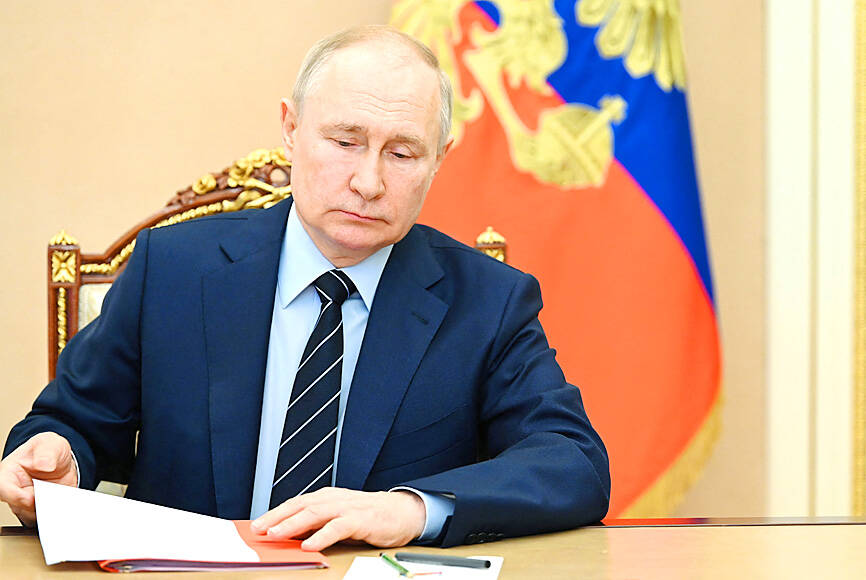Russian President Vladimir Putin wants to attend an economic summit in South Africa next month and the country is desperately trying to persuade him to stay away to avoid the legal and diplomatic fallout over his international arrest warrant, South Africa’s deputy president said in an interview with a news Web site on Friday.
As a signatory to the treaty establishing the International Criminal Court, South Africa is obliged to arrest Putin on an indictment the court issued against the Russian leader in March for war crimes involving the abduction of children from Ukraine.
Moscow has dismissed the warrant. South African authorities are likely to breach the treaty and not arrest Putin, but some opposition parties, rights groups and legal advocates have said he should be arrested and have threatened to do it themselves, raising security issues for the BRICS summit in Johannesburg.

Photo: AFP
Having already decided not to condemn Russia over its invasion of Ukraine, South Africa faces the prospect of further straining relations with the West if it allows Putin to freely attend the summit of the BRICS emerging economies bloc of Brazil, Russia, India, China and South Africa.
Russia wants Putin to attend alongside Chinese President Xi Jinping (習近平) and the other presidents, South African Vice President Paul Mashatile said in the interview with News24, a top South African news outlet.
“It’s a big dilemma for us. Of course, we cannot arrest him,” Mashatile said. “It’s almost like you invite your friend to your house, and then arrest them. That’s why for us, his not coming is the best solution. The Russians are not happy, though. They want him to come.”
Mashatile was put in charge of finding a solution by South African President Cyril Ramaphosa. Russia has rejected the alternatives, which included moving the summit to China, holding a virtual summit or Moscow being represented by Russian Minister of Foreign Affairs Sergey Lavrov, Mashatile said.
Ramaphosa is now attempting to convince Putin not to travel to South Africa when they meet at the Russia-Africa summit in St Petersburg at the end of this month, Mashatile said.
“We’ve now decided to leave this matter with the president, who is talking to Putin,” Mashatile said. “The president is going to the Russia-Africa summit later this month, so they will continue to talk. We want to show him the challenges that we face because we are part of the Rome Statute and we can’t wiggle out of this.”

In the sweltering streets of Jakarta, buskers carry towering, hollow puppets and pass around a bucket for donations. Now, they fear becoming outlaws. City authorities said they would crack down on use of the sacred ondel-ondel puppets, which can stand as tall as a truck, and they are drafting legislation to remove what they view as a street nuisance. Performances featuring the puppets — originally used by Jakarta’s Betawi people to ward off evil spirits — would be allowed only at set events. The ban could leave many ondel-ondel buskers in Jakarta jobless. “I am confused and anxious. I fear getting raided or even

Kemal Ozdemir looked up at the bare peaks of Mount Cilo in Turkey’s Kurdish majority southeast. “There were glaciers 10 years ago,” he recalled under a cloudless sky. A mountain guide for 15 years, Ozdemir then turned toward the torrent carrying dozens of blocks of ice below a slope covered with grass and rocks — a sign of glacier loss being exacerbated by global warming. “You can see that there are quite a few pieces of glacier in the water right now ... the reason why the waterfalls flow lushly actually shows us how fast the ice is melting,” he said.

Eleven people, including a former minister, were arrested in Serbia on Friday over a train station disaster in which 16 people died. The concrete canopy of the newly renovated station in the northern city of Novi Sad collapsed on Nov. 1, 2024 in a disaster widely blamed on corruption and poor oversight. It sparked a wave of student-led protests and led to the resignation of then-Serbian prime minister Milos Vucevic and the fall of his government. The public prosecutor’s office in Novi Sad opened an investigation into the accident and deaths. In February, the public prosecutor’s office for organized crime opened another probe into

RISING RACISM: A Japanese group called on China to assure safety in the country, while the Chinese embassy in Tokyo urged action against a ‘surge in xenophobia’ A Japanese woman living in China was attacked and injured by a man in a subway station in Suzhou, China, Japanese media said, hours after two Chinese men were seriously injured in violence in Tokyo. The attacks on Thursday raised concern about xenophobic sentiment in China and Japan that have been blamed for assaults in both countries. It was the third attack involving Japanese living in China since last year. In the two previous cases in China, Chinese authorities have insisted they were isolated incidents. Japanese broadcaster NHK did not identify the woman injured in Suzhou by name, but, citing the Japanese